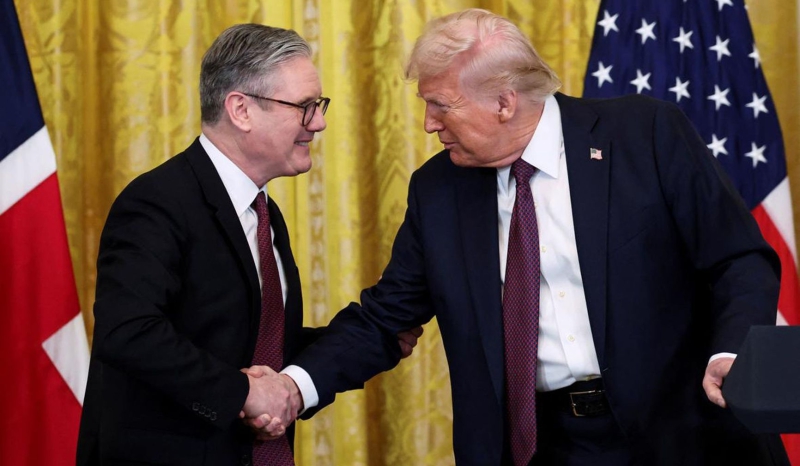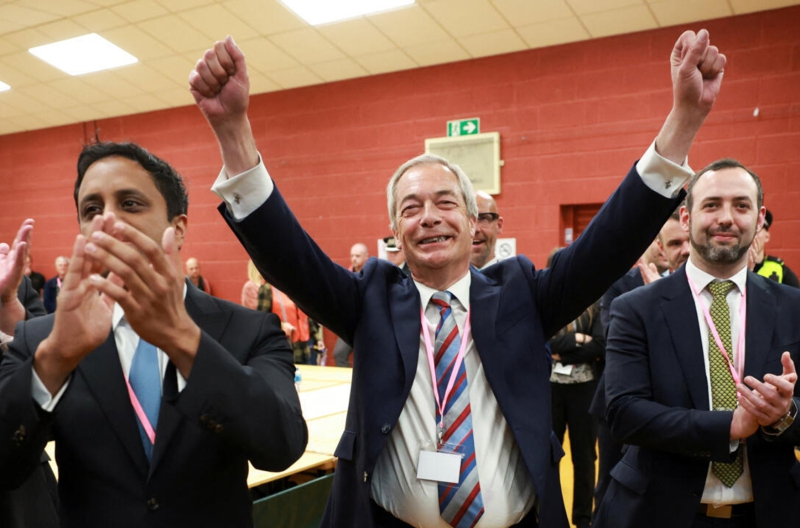© Phil Noble / Reuters
Dominic Cummings, the influential political strategist and former adviser to ex-Prime Minister Boris Johnson, said in a May 28 interview with Sky News that Nigel Farage has a real shot at becoming Britain’s next prime minister when general elections are held — sometime on or before August 21, 2029. The rise of the right-wing populist Reform UK party — and its controversial leader Farage — has sent shockwaves through the UK political landscape. In a seismic shift, both the ruling Labour Party and the Conservative Party suffered unprecedented defeats in recent local elections, and pollsters now predict a political realignment: Reform UK is currently the most popular party in the country. If a general election were held today, the right-wing movement could secure a majority in the House of Commons. How? The Faragists are promising the British public everything at once: drastic tax cuts, solutions to deep-rooted social issues, and a complete halt to all immigration — both legal and illegal. Their success has been fueled by the plummeting popularity of the ruling Labour Party, the UK’s ongoing economic challenges, and Donald Trump’s rising popularity — at least among a certain segment of the British population. However, the next general election is still likely to be years away, giving Britain’s traditional parties a chance to regroup and rise to the challenge.
One of Reform UK’s more visible figures, Shaun Matthews, gained notoriety in 2022 for a controversial social media post warning the world about the alleged dangers of circumcision. “It's no surprise that children want to remove their penises and become girls,” Matthews wrote. “Most of their parents started the process shortly after birth, by chopping their foreskin off in the name of (insert deity).”
It’s hard to believe anyone took Matthews seriously. His comments were clearly crude and malicious — mocking Jews, Muslims, and transgender people alike. Now, as head of Lincolnshire County Council, Matthews has taken the post down, reportedly on the advice of senior party members.
But deleting the post likely does not reflect a change of heart. The fact that someone who is now in such a high-ranking governmental position once felt free to make such offensive and provocative remarks says a lot about the kind of people now vying for power under Farage’s banner. And Matthews is not an isolated case.
The fact that someone in such a high-ranking governmental position once felt free to make such offensive remarks says a lot about the kind of people now vying for power under Farage’s banner
According to a report by The Jewish Chronicle, a Reform UK candidate in Doncaster shared a meme on Facebook that praised Adolf Hitler. Others in the party have reposted material from neo-Nazi groups, spread conspiracy theories about Jewish banking families, shared videos from antisemitic conspiracy theorist David Icke, promoted claims that Israel was behind the 9/11 attacks, and alleged that environmental activist Greta Thunberg is controlled by the Rothschild family.
How many of Reform UK’s 677 newly elected local councilors hold such openly racist, antisemitic, or xenophobic views is unknown. But signs suggest the number isn’t small. Farage and his deputy, Richard Tice, have publicly demanded that party members show restraint, threatening disciplinary action for any who speak out of turn. “If anyone says or writes anything which is daft or inappropriate, we will look at it,” Tice said.
The May elections were a sweeping triumph for Reform UK and its leader. Britain's mainstream parties were handed an embarrassing defeat, while the Faragists managed to clinch their fifth seat in the House of Commons after narrowly defeating Labour by a margin of just six votes in a parliamentary by-election in northwest England.
The bottom line: polling data and electoral projections now suggest that Reform UK is the most popular political party in the UK. If an election were held today, it could command a majority in the House of Commons.
Polling data suggests that if a general election were held today, Reform UK could win a majority in the House of Commons
With support from the Conservative Party’s right wing, Reform UK could theoretically be in a position to form a government — such is the nature of Britain’s majoritarian electoral system. According to an Ipsos poll, 37% of Britons already believe that Nigel Farage could become the country’s next prime minister.
Not long ago, Reform UK was viewed as a fringe group of amateurish outcasts — nothing more than a bizarre political aftershock of Brexit. Its leader, Farage, had been one of the main architects of the 2016 EU withdrawal referendum. But after the Brexit vote ended in a “win” for the anti-European movement, regret over the decision began to spread among the public, and Farage’s forces appeared to have lost their raison d'être.
In last year’s elections, Reform UK won only five Commons seats — one of which it later lost after expelling an MP who dared to criticize Farage. So how did such a sudden and stunning turnaround occur? And what exactly is the Faragist vision for Britain?
In classic populist style, they’re promising everything, immediately, and at no cost to their supporters: massive tax cuts, a fix for the broken National Health Service, cuts to climate-related spending, and above all, a complete end to immigration. Not just illegal immigration — all immigration. However, how they intend to deliver on these promises remains unclear.
The UK already faces severe labor shortages in key industries. So how will those gaps be filled following a total immigration ban? And with sweeping tax cuts on the table, how will the government fund public services or address the country’s budget shortfall?
Despite Farage’s inability to answer any serious questions, disillusionment with Labour continues to grow. Despite holding power, the party has failed to produce a credible plan for economic growth or address the pressing issues facing the country. Prime Minister Keir Starmer’s approval rating has plummeted to a paltry 23% — a clear reflection of widespread public frustration with the government.
It seems likely that the electoral pendulum will swing sharply to the right in the next general election. But aside from Reform UK, the only other contender on that side of the spectrum is the battered, humiliated, and divided Conservative Party.
Meanwhile, in the past year, Reform UK’s membership has ballooned from 60,000 to 227,000, fueled largely by defectors from the Conservatives. Many voters have followed suit — particularly those who resent political correctness, liberal values, and, in many cases, “foreigners.”
Some former supporters of the now-banned, overtly Nazi British National Party (BNP) have also found a home in Reform UK. The party has effectively replaced the Conservatives as Britain’s main right-wing opposition — only in a much more radical form.
On the eve of the elections, Farage began to call for “reindustrialization.” He floated protectionist economic policies and began courting labor unions. He has clearly been paying attention to polls suggesting that Reform UK could become the political home of Britain’s working class — displacing Labour.
Reform UK has effectively replaced the Conservatives as Britain’s main right-wing opposition — only in a much more radical form
What’s especially striking is the inspiration driving many of Farage’s new followers: the triumph of Donald Trump and the rise of Trumpism. Surveys show that Reform UK supporters are the only social group in Britain that views Trump and his record favorably. They are drawn to his defiance of traditional Western values, his hostility toward elites, and his campaign against the so-called “deep state.” Reform UK’s central slogan, “Make Britain Great Again,” is a direct echo of the MAGA movement.
Yet Farage’s Trumpist base remains a minority in Britain. Despite political divisions, around 60% of Britons view Trump negatively. When asked to describe him in one word, common poll responses included “idiot,” “dangerous,” “funny,” and “narcissist.”
A minor social media celebrity in liberal circles, the self-described “harmless Buddhist” Nate White, gained widespread recognition for a series of tweets that many saw as the most eloquent explanation of why Britons dislike Trump:
“Trump lacks certain qualities which the British traditionally esteem. For instance, he has no class, no charm, no coolness, no credibility, no compassion, no wit, no warmth, no wisdom, no subtlety, no sensitivity, no self-awareness, no humility, no honour, and no grace… We like a laugh. And while Trump may be laughable, he has never once said anything wry, witty, or even faintly amusing — not once, not ever. And that fact is particularly disturbing to the British sensibility – for us, to lack humour is almost inhuman. But with Trump, it’s a fact. He doesn't even seem to understand what a joke is. His idea of a joke is a crass comment, an illiterate insult, a casual act of cruelty.”
Trumpism, then, is more than just a political preference — it is becoming a cultural and ideological dividing line. Only about 20% of Britons feel positively toward Trump, but that still amounts to millions of people. And nearly all of them support Reform UK and Farage. It’s as if they inhabit a different country — or even a different planet.
They populate their own echo chambers: social media groups, fringe forums, and the reader comment sections of right-wing tabloids like The Daily Mail, The Sun, and the more upscale Telegraph.
Interestingly, The Telegraph’s editorial line often criticizes Trump’s actions, labeling his trade wars “reckless” and harmful to U.S. companies. Yet it also ran pieces crediting Trump’s “bold leadership” with winning “significant favour with [British] working-class voters.”

Many voters now argue that Trump’s combative style stands in stark contrast to the timid, dithering responses of successive British prime ministers to crises like immigration, housing shortages, and the collapse of the NHS. “Few would call Trump nice or fair,” one journalist wrote, “but public disillusionment with Britain’s state of affairs has made such concerns irrelevant.”
On online forums, a kind of Trump cult is taking shape. There, hatred for the British government runs hot — not because it supports Trump, but because it doesn’t follow him closely enough.
Some of the comments read:
“I’d love to have Trump as our leader. I want someone who puts our country first for a change.”
“If Trump wanted to annex the UK right now, I'd accept willingly.”
“Why can't we have a leader like Trump instead of a loser like Starmer?”
And so on and so forth.
One user wrote, “It’s no wonder most people want Trump to lead Britain” — and others enthusiastically agreed. When shown polling data indicating that most Britons don’t want Trump anywhere near 10 Downing Street, they reject it outright, branding it as fake. They “know” they’re the majority, and pity anyone who believes otherwise.
“Open your eyes, shed the leftist blindfold, and you’ll find freedom!” wrote another commenter. To those longing for a “British Trump,” the answer already appears to be there in the form of Farage — “We do have one, not a carbon copy, but then I wouldn't want him to be, all we've got to do is vote for him. It really is that simple.”
Farage himself once openly praised Vladimir Putin and blamed NATO and the EU for provoking the war in Ukraine. Yet the war remains a major issue in British politics, and most Britons continue to support the provision of aid to Ukraine. Unsurprisingly, most also view Putin’s Russia as the aggressor.
Farage once openly praised Vladimir Putin and blamed NATO and the EU for provoking the war in Ukraine
Keir Starmer had been gaining political capital by consistently aligning himself with mainstream public sentiment — and many believe his approval ratings would be even lower if not for those efforts to please. But a recent episode shook Britain to its core: a disgraceful scene in the Oval Office, where President Volodymyr Zelensky was subjected to humiliating attacks from Donald Trump and Vice President J.D. Vance. For many Britons, known for their sense of decorum, the display was nothing short of appalling.
The incident has dominated both the headlines and everyday conversations — I’ve heard it mentioned everywhere, from close friends and casual acquaintances. Many appear to agree with columnist Matthew Syed, who wrote, “Never again can we allow the bully in the White House to isolate one of our friends as he did Ukraine.”
Yet even among critics of the U.S. president, a sharp divide is emerging over how Britain’s government should navigate its relationship with Washington. A growing number are condemning Prime Minister Starmer and his cabinet, accusing them of groveling before Trump in hopes of avoiding economically ruinous tariffs.

Syed called the prime minister’s behavior during his Washington visit “disgusting and nauseating.” “Genuflecting like an errant sixth-former,” Syed wrote, “Starmer paraded a letter from the King, hoping that this toadying would spare the UK the bullying endured by Panama, Canada, Mexico, and Denmark. Please leave me alone, sir! Spare me, sir!”
What is now evident is that Labour’s leadership, facing the reality of Trump’s return to power, has opted for full-on flattery in the hope that such a posture might yield diplomatic and economic rewards. “Is it really such a sacrifice,” the thinking seems to go, “to grovel a little, to pretend we like and respect him, if that helps us avoid disaster — if it protects our economy, our welfare, the very future of this country?” And so, even those within Labour who not long ago labeled Trump a scoundrel, a liar, and a racist now appear locked in a competition to outdo one another in praise of the man whom Americans have now twice elected to the highest office in their land.
Many Britons are outraged. Critics argue that this public act of submission will not be forgotten — not by the public, not by history. That such blatant falsehood, pretense, and hypocrisy at the highest level of government is corrosive: eroding society and cheapening fundamental values. And yet, a clear majority appears to see the strategy as a necessary evil in a world gone mad. The goal, they argue, is to avert disaster — even at the cost of their country’s dignity.
Here’s a snapshot of a typical debate among anti-Trump liberals and centrists on social media:
“I say we support Starmer’s actions, rather than resort to empty threats.”
“I’d rather be poor than enable Trump.”
“Well, I’d rather keep my job.”
“We need to unite with the EU and push back.”
“Starmer’s right. Just leave Trump alone — he’ll self-destruct.”
“Starmer should reflect the will of the British people and cancel Trump’s state visit. If that monster sets foot here, it will spark protests like we’ve never seen.”
“It’s hard to deal with the orange idiot, and Starmer has a tough job. I think he’s handling it well.”
“The King shouldn’t be forced to honor such a terrible man.”
“Starmer is doing the right thing. Like an adult. This isn’t the time for drama or empty bravado.”
Pragmatists claimed victory when Starmer succeeded in securing a partial rollback of U.S. tariffs — proving, they say, that the humiliation was worth it.
But for many on the left, the government’s behavior is unforgivable for another reason: it seems to have contracted a strain of political Trumpism. Labour leaders now speak of immigration — which once was clearly separated into legal and illegal categories — as an existential threat. Labour had long insisted that legal immigration brings clear economic benefits. Now, the prime minister’s rhetoric at times mirrors that of Reform UK. He has warned that Britain risks becoming “an island of strangers,” and claimed the current immigration system was one of the “forces that are slowly pulling our country apart.”
As one Twitter user quipped: “What happened — did Farage hack Starmer’s account?”
The reality is clear: Labour’s leadership is panicking in the face of Farage’s surge and has decided that the only way to defeat the populists is to imitate them. As one of Starmer’s aides is said to have said, with bitter irony: “We’re basically saying, ‘Farage is right — just don’t vote for him.’” But such a strategy is unlikely to win over hardened right-wing populist voters — and it risks alienating Labour’s traditional base: the liberal urban intelligentsia. Without them, who will vote Labour?

